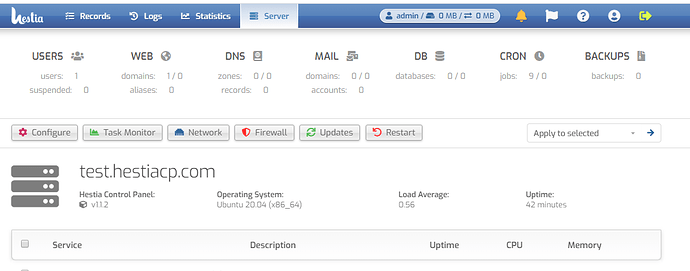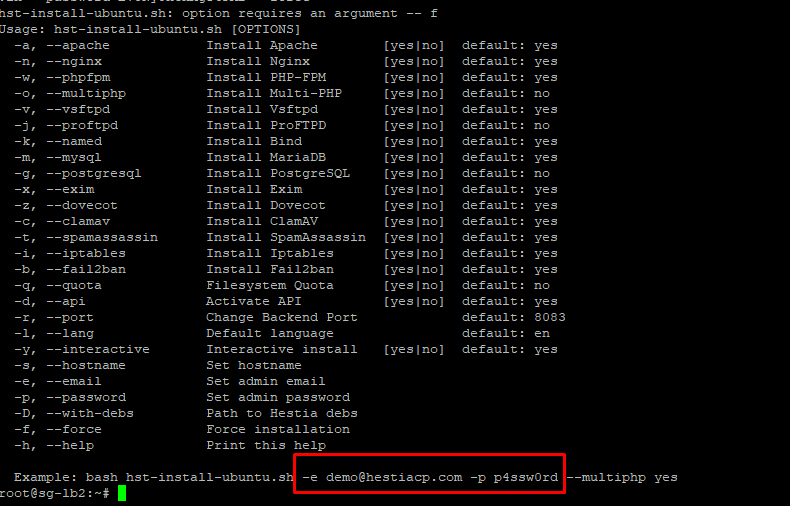I just downloaded Ubuntu 20.04, and thought I’d try installing Hestia on it, to give you guys some feedback. I notice the install script doesn’t reference 20.04 yet. Is there a process for testing? Another branch of install files we can use?
Maybe if others want to try this, we can all share our feedback in this thread?
We’re currently waiting for mariadb and sury to completely support Ubuntu 20.04, then we will start testing. Currently there is already a testbranch, but without support of the used repos, it doesnt make that much sense to try it  .
.
https://github.com/hestiacp/hestiacp/tree/core-ubuntu-20.04
Edit: Sury has already uploaded packages for 20.04, only MariaDB ships currently only 10.5 beta.
Fair enough. Will wait until mariadb updates. Just checked Digital Ocean, and their Ubuntu 20.04 droplets are ready to go there …
Noticed you’d decided to go with the default focal mariadb at version 10.3, so I thought I’d give it another go. Got the following
E: The repository ‘http://nginx.org/packages/mainline/ubuntu focal Release’ does not have a Release file.
E: The repository ‘https://apt.hestiacp.com focal Release’ does not have a Release file.
You might consider also going with the default nginx on focal which is 1.17.
root:~# apt policy nginx
nginx:
Installed: (none)
Candidate: 1.17.10-0ubuntu1
Version table:
1.17.10-0ubuntu1 500
500 http://ph.archive.ubuntu.com/ubuntu focal/main amd64 Packages
Then just the hestiacp repo to set up … 
Also noticed, that apt-transport-https isn’t installed by default on focal. You might want to add that to your list of pre-flight checks, if you think its important.
Even if you made these changes temporarily, they’d allow us to get testing.
Sury repository does also miss the php packages, currently the repositories arent ready yet.
We’ll have to wait at least for sury to get all php packages.
Nginx repos are up. Still only 10.5 beta from mariadb
Thanks for the update, also checking the repos every day here  .
.
I am waiting to test Hestia with 20.04 too.
Waiting ^^ Hestia for Ubuntu 20 LTS
We will proceed the testing process this weekend, if all is working well, we will have the support soon  .
.
Just a small update from the weekend dev front:
Services are up and running, currently still working on small bugfixes.
Again a small update: There are some bugs that need more work than expected - we’ll do our best to fix them and provide the OS support as soon as possible!
Ok, we’ve got now a working installer for ubuntu 20.04, also our repository has got new packages for the new release name (php, nginx, and hestia).
It would be awesome, if everyone could test the new installation script and also hestia itself (add domains, create certificates, test mail services…) and report us any issues.
You’ll find the new installer script in the core-ubuntu-20.04 branch on github: https://github.com/hestiacp/hestiacp/tree/core-ubuntu-20.04
Fast way to install:
wget https://raw.githubusercontent.com/hestiacp/hestiacp/master/install/hst-install-ubuntu.sh
bash hst-install-ubuntu.sh
groupdel admin // i need to run this on digitaloncean
i was only trying to add nginx and apache
bash hst-install-ubuntu.sh --apache yes --nginx yes --phpfpm yes --multiphp no --vsftpd no --proftpd no --named yes --mysql no --postgresql no --exim no --dovecot no --clamav no --spamassassin no --iptables no --fail2ban no --quota no --api yes --lang en --hostname lb2 -email gmailhere -password passwordhere --force
The following server components will be installed on your system:
- NGINX Web / Proxy Server
- Apache Web Server (as backend)
- PHP-FPM Application Server
- Bind DNS Server
====================================================================
Would you like to continue with the installation? [Y/N]: Y
Installation backup directory: /root/hst_install_backups/140520200848
Installation log file: /root/hst_install_backups/hst_install-140520200848.log
Adding required repositories to proceed with installation:
() NGINX
() PHP
() Apache2
() Hestia Control Panel
Updating currently installed packages, please wait…-
Now installing Hestia Control Panel and all required dependencies.
NOTE: This process may take 10 to 15 minutes to complete, please wait…
() Configuring system settings…
() Configuring Hestia Control Panel…
() Generating default self-signed SSL certificate…
() Adding SSL certificate to Hestia Control Panel…
() Configuring NGINX…
() Configuring Apache Web Server…
() Configuring PHP-FPM…
() Configuring PHP…
(*) Configuring Bind DNS server…
Error: invalid email format :: mail
Error: can’t create admin user
root@lb2:~#
i’ve tried this script https://raw.githubusercontent.com/hestiacp/hestiacp/4cbdb81dcb74a6f57a6f7944d7c25359b1886d7a/install/hst-install.sh
The following server components will be installed on your system:
- NGINX Web / Proxy Server
- Apache Web Server (as backend)
- PHP-FPM Application Server
- Bind DNS Server
====================================================================
Would you like to continue with the installation? [Y/N]: Y
Installation backup directory: /root/hst_install_backups/140520200906
Installation log file: /root/hst_install_backups/hst_install-140520200906.log
Adding required repositories to proceed with installation:
() NGINX
() PHP
() MariaDB
() Hestia Control Panel
Updating currently installed packages, please wait…
Now installing Hestia Control Panel and all required dependencies.
NOTE: This process may take 10 to 15 minutes to complete, please wait… -
() Configuring system settings…
sed: can’t read /etc/rssh.conf: No such file or directory
sed: can’t read /etc/rssh.conf: No such file or directory
sed: can’t read /etc/rssh.conf: No such file or directory
chmod: cannot access ‘/usr/bin/rssh’: No such file or directory
() Configuring Hestia Control Panel…
cp: cannot stat ‘/usr/local/hestia/install/deb/sudo/admin’: No such file or directory
cp: cannot stat ‘/usr/local/hestia/install/deb/logrotate/hestia’: No such file or directory
cp: cannot stat ‘/usr/local/hestia/install/deb/packages’: No such file or directory
sed: can’t read /usr/local/hestia/data/packages/.pkg: No such file or directory
cp: cannot stat ‘/usr/local/hestia/install/deb/templates’: No such file or directory
cp: cannot stat ‘/usr/local/hestia/install/deb/templates/web/unassigned/index.html’: No such file or directory
cp: cannot stat '/usr/local/hestia/install/deb/templates/web/skel/document_errors/’: No such file or directory
cp: cannot stat ‘/usr/local/hestia/install/deb/firewall’: No such file or directory
() Generating default self-signed SSL certificate…
hst-install-ubuntu.sh: line 1078: /usr/local/hestia/bin/v-generate-ssl-cert: No such file or directory
() Adding SSL certificate to Hestia Control Panel…
sed: -e expression #1, char 3: unexpected ,' sed: -e expression #1, char 1: unknown command: ,’
cp: cannot stat ‘/usr/local/hestia/install/deb/ssl/dhparam.pem’: No such file or directory
(*) Configuring NGINX…
cp: cannot stat ‘/usr/local/hestia/install/deb/nginx/nginx.conf’: No such file or directory
cp: cannot stat ‘/usr/local/hestia/install/deb/nginx/status.conf’: No such file or directory
cp: cannot stat ‘/usr/local/hestia/install/deb/nginx/phpmyadmin.inc’: No such file or directory
cp: cannot stat ‘/usr/local/hestia/install/deb/nginx/phppgadmin.inc’: No such file or directory
cp: cannot stat ‘/usr/local/hestia/install/deb/logrotate/nginx’: No such file or directory
sed: can’t read /etc/nginx/nginx.conf: No such file or directory
sed: can’t read /usr/local/hestia/nginx/conf/nginx.conf: No such file or directory
Failed to start nginx.service: Unit nginx.service not found.
Error: nginx start failed
root@lb2:~#
it’s asking to put those stuff like this
-e [email protected] -p p4ssw0rd
-e and -p works also fine. How ever --email and --password are the “long” string alternatives.
Give me a few minutes and will try it on my own… With a local test server

 And Hestia too.
And Hestia too. 